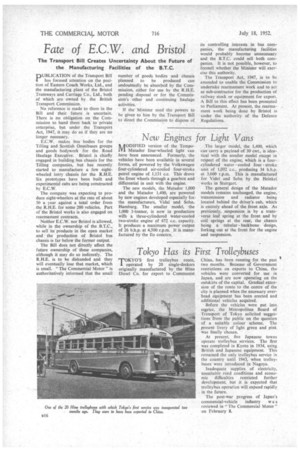Fate of E.C.W. and Bristol
Page 50

If you've noticed an error in this article please click here to report it so we can fix it.
The Transport Bill Creates Uncertainty About the Future of the Manufacturing Facilities of the B.T.C.
DUBLICAT10N of the Transport Bill has focused attention on the position of Eastern Coach Works, Ltd., and the manufacturing plant of the Bristol Tramways and Carriage Co., Ltd., both of which are owned by the British Transport Commission.'
No reference is made to them in the Bill and their future is uncertain, There is no obligation on the Commission to hand them back" to private enterprise, but under the Transport Act, 1947, it may do so if they are no longer necessary.
E.C.W. makes bus bodies for the• Tilling and Scottish Omnibuses groups and goods• bodywork for the Road Haulage Executive. Bristol is chiefly engaged in building bus chassis for the Tilling companies, but has recently started to manufacture a few eightwheeled lorry chassis for the R.H.E. Six prototypes have been built and experimental cabs are being constructed by E.C.W.
The company was expecting to pro. duce eight-wheelers at the rate of about 50 a year against a total order from the R.H.E. for some 200 vehicles. Part of the Bristol works is also engaged on rearmament contracts.
Neither E.C.W. nor Bristol is allowed, while in the ownership of the B.T.C., to sell its' products in the open market. and the production of Bristol bus chassis is far below the former output.
The Bill does not directly affect the future ownership of these companies, although it may do so indirectly. The R.H.E. is to be disbanded and they will eventually lose that market, which is small. "The Commercial Motor" is authoritatively informed that the small
number of goods bodies and chassis planned to be produced can undoubtedly be absorbed by the Commission, either for use by the RILE. pending disposal or for the Commission's other and .continuing haulage activities.
If the' Minister used the powers to be given to him by the Transport Bill to 'direct the Commission to dispose of its controlling interests in bus companies, the manufacturing facilities would probably become unnecessary and the B.T.C. could sell both companies. It is not possible, however, to foretell whether the Minister will exercise this authority.
The Transport Act, 1947, is to be amended to enable the Commission to undertake rearmament work and to act as sub-contractor for the production of railway stock or equipment for export. A Bill to this effect has been presented to Parliament. At present, the rearmament work being done by Bristol is under the authority of the Defence .Regulations.




























































































